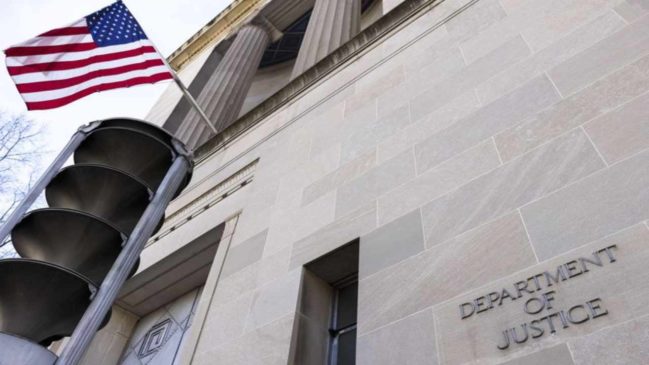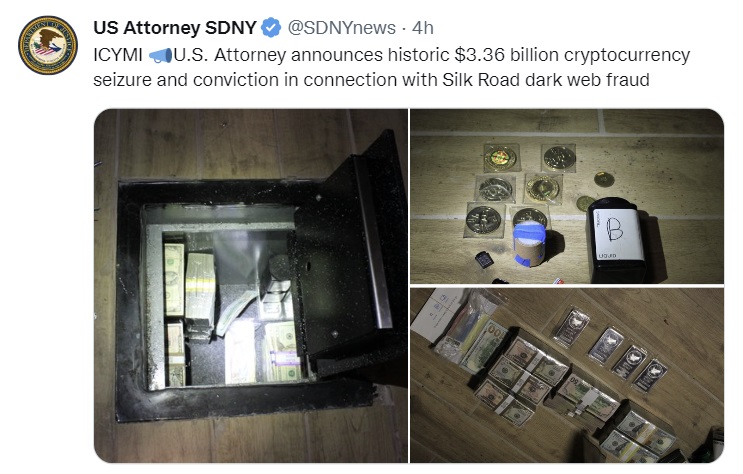The man who stole over 50,000 bitcoins from the Silk Road marketplace has pleaded guilty. According to the U.S. Department of Justice, “the seizure was then the largest cryptocurrency seizure” in the history of the DOJ and “remains the department’s second-largest financial seizure ever.”
Silk Road Exploiter Pleads Guilty
The U.S. Department of Justice (DOJ) announced Monday that James Zhong pleaded guilty on Friday “to committing wire fraud in September 2012 when he unlawfully obtained over 50,000 bitcoin from the Silk Road dark web internet marketplace.” The Justice Department also announced a “historic $3.36 billion cryptocurrency seizure” in connection to the case.
The DOJ explained that law enforcement conducted a search at Zhong’s house in Gainesville, Georgia, on Nov. 9, 2021, and “seized approximately 50,676.17851897 bitcoin, then valued at over $3.36 billion,” elaborating:
This seizure was then the largest cryptocurrency seizure in the history of the U.S. Department of Justice and today remains the department’s second-largest financial seizure ever.
Zhong also had about 3,500 more bitcoins from exchanging into BTC over 50,000 bitcoin cash (BCH) which he received following the bitcoin blockchain hard fork in August 2017. He used an overseas cryptocurrency exchange for the conversion.
Besides the BTC seized at his house, Zhong began “voluntarily surrendering to the government additional bitcoin” beginning in March this year, the DOJ revealed, adding that “In total, Zhong voluntarily surrendered 1,004.14621836 additional bitcoin.”
The government is seeking the forfeiture of “approximately 51,680.32473733 bitcoin,” the DOJ noted. At the time of writing, BTC is trading at $20,641.28, so the amount sought by the government is about $1.07 billion.
Zhong’s Scheme to Defraud Silk Road Marketplace
Zhong executed a scheme to defraud the Silk Road marketplace of its money and property in September 2012, the DOJ said, adding that he “was able to withdraw many times more bitcoin out of Silk Road than he had deposited in the first instance.” For example, the Justice Department detailed that on Sept. 19, 2012:
Zhong deposited 500 bitcoin into a Silk Road wallet. Less than five seconds after making the initial deposit, Zhong executed five withdrawals of 500 bitcoin in rapid succession — i.e., within the same second — resulting in a net gain of 2,000 bitcoin.
On Monday, the U.S. government filed an Amended Preliminary Order of Forfeiture in the United States v. Ross Ulbricht case “seeking to forfeit approximately 51,351.89785803 bitcoin traceable to Silk Road, valued at approximately $3,388,817,011.90 at the time of seizure.” Silk Road’s founder, Ross Ulbricht, was convicted in 2015 and is currently serving a double life sentence, plus 40 years without parole.
U.S. District Judge Paul Gardephe also entered a Consent Preliminary Order of Forfeiture on Friday for 154.4268793000044 BTC, $661,900 in cash, 25 Casascius coins (physical bitcoin) worth about 174 BTC, various metals, and Zhong’s 80% interest in Memphis-based RE&D Investments LLC. The metals seized consisted of “four one-ounce silver-colored bars, three one-ounce gold-colored bars, four 10-ounce silver-colored bars, and one gold-colored coin,” the Justice Department highlighted.
Following the DOJ’s announcement, some people on social media began noticing that one of Zhong’s BTC addresses revealed in a court document matches one posted by Bitcointalk user “Loaded.” Bitmex Research tweeted: “In March 2017, Bitcointalk user ‘Loaded’ signed a message from an address with 40,000 bitcoin, asking to do a 1 to 1 swap for ‘Bitcoin Unlimited’ with Roger Ver. It now appears these funds have been seized by the U.S. authorities.”
Commenting on Loaded’s Bitcointalk post, Bitcoin.com founder Ver, stated: “As I recall, he never replied to my DMs about making the bet.”
What do you think about this case? Let us know in the comments section below.
Image Credits: Shutterstock, Pixabay, Wiki Commons
Disclaimer: This article is for informational purposes only. It is not a direct offer or solicitation of an offer to buy or sell, or a recommendation or endorsement of any products, services, or companies. Bitcoin.com does not provide investment, tax, legal, or accounting advice. Neither the company nor the author is responsible, directly or indirectly, for any damage or loss caused or alleged to be caused by or in connection with the use of or reliance on any content, goods or services mentioned in this article.




